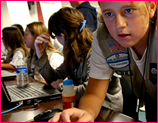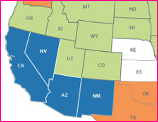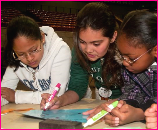Posted on February 28th, 2011 by ASEE
 Microsoft founder Bill Gates says the nation isn’t getting its money’s worth in education, and faults two assumptions that have led to rising costs: that reducing class size will boost student achievement, and that teachers must be rewarded on the basis of seniority. He suggests identifying the top 25 percent of teachers and paying them more to teach more students.
Microsoft founder Bill Gates says the nation isn’t getting its money’s worth in education, and faults two assumptions that have led to rising costs: that reducing class size will boost student achievement, and that teachers must be rewarded on the basis of seniority. He suggests identifying the top 25 percent of teachers and paying them more to teach more students.
Read More
Filed under: K-12 Education News | 1 Comment »
Tags: Corporations, Education Policy, Research on Learning, Teacher Training, Teachers
Posted on February 13th, 2011 by Mary Lord
 Informal, out-of-school science and math programs offer great ways to engage girls in the subjects, but they need to be carefully planned and executed to make sure reluctant students want to sign up for and stick with them, Education Week’s Beyond School blog reports on findings from a new Harvard Family Research Project report.
Informal, out-of-school science and math programs offer great ways to engage girls in the subjects, but they need to be carefully planned and executed to make sure reluctant students want to sign up for and stick with them, Education Week’s Beyond School blog reports on findings from a new Harvard Family Research Project report.
Read More
Filed under: K-12 Education News | Comments Off on Informal Science Programs Can Benefit Girls
Tags: Girl Scouts, Girls Education, Programs for Girls, Research, Research on Learning
Posted on February 6th, 2011 by Jaimie Schock
 Within five years, every K-12 student in America will be using a mobile handheld device as a part of learning, according to Elliot Soloway, a professor at the University of Michigan. “Smart phones are the one technology that can eliminate the digital divide.”
Within five years, every K-12 student in America will be using a mobile handheld device as a part of learning, according to Elliot Soloway, a professor at the University of Michigan. “Smart phones are the one technology that can eliminate the digital divide.”
Read More
Filed under: K-12 Education News | Comments Off on Smart Phones to Eliminate Digital Divide?
Tags: Classroom Technology, Research, Research on Learning, Technology, Technology Education, Technology for Learning
Posted on January 30th, 2011 by Jaimie Schock
 Scores released January 25 from the 2009 National Assessment of Educational Progress show that many U.S. students still struggle in science. Just 34 percent of fourth graders, 30 percent of eighth graders, and 21 percent of 12th graders are performing at or above ‘proficient’ – with just a tiny fraction displaying the advanced skills that could lead to careers in science and technology.
Scores released January 25 from the 2009 National Assessment of Educational Progress show that many U.S. students still struggle in science. Just 34 percent of fourth graders, 30 percent of eighth graders, and 21 percent of 12th graders are performing at or above ‘proficient’ – with just a tiny fraction displaying the advanced skills that could lead to careers in science and technology.
Read More
Filed under: K-12 Education News | Comments Off on Most U.S. Students Not Proficient in Science
Tags: Education Policy, Publication, Research, Research on Learning, Testing
Posted on January 17th, 2011 by ASEE
 The nation receives a C when graded across the six distinct areas of policy and performance tracked by Quality Counts, the most comprehensive ongoing assessment of the state of American education. For the third year in a row, Maryland is the top-ranked state with a B-plus. The majority of states receive grades of C-plus or lower.
The nation receives a C when graded across the six distinct areas of policy and performance tracked by Quality Counts, the most comprehensive ongoing assessment of the state of American education. For the third year in a row, Maryland is the top-ranked state with a B-plus. The majority of states receive grades of C-plus or lower.
Read More
Filed under: K-12 Education News | Comments Off on U.S. Schools Earn a C
Tags: Education Policy, Public Policy, Research, Research on Learning
Posted on January 9th, 2011 by ASEE
 Nationwide, the number of students taking AP tests has surged 50 percent in the last five years. For those who hope to attend selective colleges, it’s the norm. But when a Harrisburg, Pa.-area school district sought to introduce an AP course in ninth grade, some parents balked.
Nationwide, the number of students taking AP tests has surged 50 percent in the last five years. For those who hope to attend selective colleges, it’s the norm. But when a Harrisburg, Pa.-area school district sought to introduce an AP course in ninth grade, some parents balked.
Read More
Filed under: K-12 Education News | 1 Comment »
Tags: Honors Students, Research, Research on Learning, Testing
Posted on January 9th, 2011 by ASEE
 A new report by the Information Technology and Innovation Foundation recommends that student assessments be based on skills, such as reading for information, locating information, and applied mathematics, instead of content. In STEM subjects, students’ desired outcome should be improved skills in inquiry, design, and the understanding and use of symbolic language in math.
A new report by the Information Technology and Innovation Foundation recommends that student assessments be based on skills, such as reading for information, locating information, and applied mathematics, instead of content. In STEM subjects, students’ desired outcome should be improved skills in inquiry, design, and the understanding and use of symbolic language in math.
Read More
Filed under: K-12 Education News | Comments Off on Stress Skills Instead of Content Learning, Report Urges
Tags: Education Policy, Math, Mathematics, Public Policy, Research, Research on Learning, STEM education
Posted on December 12th, 2010 by ASEE
 Shanghai 15-year-olds scored No. 1 in a major international math, science and reading test, beating students in dozens of countries, and did particularly well in math. American students placed “in the middle of the pack,” says an Education Department official.
Shanghai 15-year-olds scored No. 1 in a major international math, science and reading test, beating students in dozens of countries, and did particularly well in math. American students placed “in the middle of the pack,” says an Education Department official.
Read More
Filed under: K-12 Education News | Comments Off on Shanghai Teens are Tops in Math, Reading and Science
Tags: International K-12 Education, Research on Learning, Testing
Posted on December 5th, 2010 by ASEE
 Researchers have found a “surprisingly strong” relationship between imposition of Daylight Saving and students’ SAT scores. Students in Indiana counties that changed their clocks had scores that were 16.34 percent lower than those in counties that didn’t.
Researchers have found a “surprisingly strong” relationship between imposition of Daylight Saving and students’ SAT scores. Students in Indiana counties that changed their clocks had scores that were 16.34 percent lower than those in counties that didn’t.
Read More
Filed under: K-12 Education News | Comments Off on Daylight Saving Said to Affect SAT Scores
Tags: Research on Learning, Testing
 Microsoft founder Bill Gates says the nation isn’t getting its money’s worth in education, and faults two assumptions that have led to rising costs: that reducing class size will boost student achievement, and that teachers must be rewarded on the basis of seniority. He suggests identifying the top 25 percent of teachers and paying them more to teach more students.
Microsoft founder Bill Gates says the nation isn’t getting its money’s worth in education, and faults two assumptions that have led to rising costs: that reducing class size will boost student achievement, and that teachers must be rewarded on the basis of seniority. He suggests identifying the top 25 percent of teachers and paying them more to teach more students. 








 Informal, out-of-school science and math programs offer great ways to engage girls in the subjects, but they need to be carefully planned and executed to make sure reluctant students want to sign up for and stick with them, Education Week’s Beyond School blog reports on findings from a new Harvard Family Research Project report.
Informal, out-of-school science and math programs offer great ways to engage girls in the subjects, but they need to be carefully planned and executed to make sure reluctant students want to sign up for and stick with them, Education Week’s Beyond School blog reports on findings from a new Harvard Family Research Project report. Within five years, every K-12 student in America will be using a mobile handheld device as a part of learning, according to Elliot Soloway, a professor at the University of Michigan. “Smart phones are the one technology that can eliminate the digital divide.”
Within five years, every K-12 student in America will be using a mobile handheld device as a part of learning, according to Elliot Soloway, a professor at the University of Michigan. “Smart phones are the one technology that can eliminate the digital divide.” Scores released January 25 from the 2009 National Assessment of Educational Progress show that many U.S. students still struggle in science. Just 34 percent of fourth graders, 30 percent of eighth graders, and 21 percent of 12th graders are performing at or above ‘proficient’ – with just a tiny fraction displaying the advanced skills that could lead to careers in science and technology.
Scores released January 25 from the 2009 National Assessment of Educational Progress show that many U.S. students still struggle in science. Just 34 percent of fourth graders, 30 percent of eighth graders, and 21 percent of 12th graders are performing at or above ‘proficient’ – with just a tiny fraction displaying the advanced skills that could lead to careers in science and technology.  The nation receives a C when graded across the six distinct areas of policy and performance tracked by Quality Counts, the most comprehensive ongoing assessment of the state of American education. For the third year in a row, Maryland is the top-ranked state with a B-plus. The majority of states receive grades of C-plus or lower.
The nation receives a C when graded across the six distinct areas of policy and performance tracked by Quality Counts, the most comprehensive ongoing assessment of the state of American education. For the third year in a row, Maryland is the top-ranked state with a B-plus. The majority of states receive grades of C-plus or lower. Nationwide, the number of students taking AP tests has surged 50 percent in the last five years. For those who hope to attend selective colleges, it’s the norm. But when a Harrisburg, Pa.-area school district sought to introduce an AP course in ninth grade, some parents balked.
Nationwide, the number of students taking AP tests has surged 50 percent in the last five years. For those who hope to attend selective colleges, it’s the norm. But when a Harrisburg, Pa.-area school district sought to introduce an AP course in ninth grade, some parents balked.  A new report by the Information Technology and Innovation Foundation recommends that student assessments be based on skills, such as reading for information, locating information, and applied mathematics, instead of content. In STEM subjects, students’ desired outcome should be improved skills in inquiry, design, and the understanding and use of symbolic language in math.
A new report by the Information Technology and Innovation Foundation recommends that student assessments be based on skills, such as reading for information, locating information, and applied mathematics, instead of content. In STEM subjects, students’ desired outcome should be improved skills in inquiry, design, and the understanding and use of symbolic language in math.  Shanghai 15-year-olds scored No. 1 in a major international math, science and reading test, beating students in dozens of countries, and did particularly well in math. American students placed “in the middle of the pack,” says an Education Department official.
Shanghai 15-year-olds scored No. 1 in a major international math, science and reading test, beating students in dozens of countries, and did particularly well in math. American students placed “in the middle of the pack,” says an Education Department official.  Researchers have found a “surprisingly strong” relationship between imposition of Daylight Saving and students’ SAT scores. Students in Indiana counties that changed their clocks had scores that were 16.34 percent lower than those in counties that didn’t.
Researchers have found a “surprisingly strong” relationship between imposition of Daylight Saving and students’ SAT scores. Students in Indiana counties that changed their clocks had scores that were 16.34 percent lower than those in counties that didn’t.